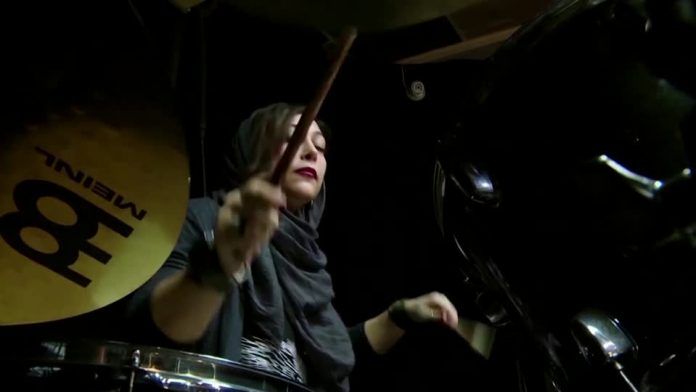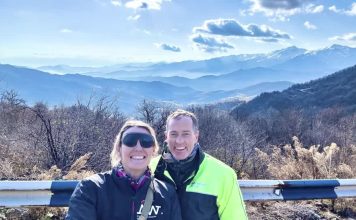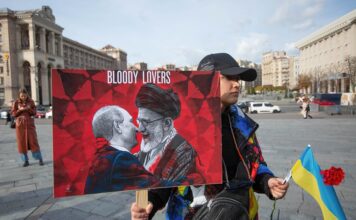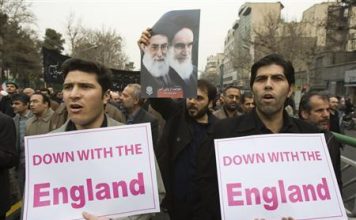[aesop_content color=”#ffffff” background=”#0892d0″ columns=”1″ position=”none” imgrepeat=”no-repeat” disable_bgshading=”off” floaterposition=”left” floaterdirection=”up” revealfx=”off” overlay_revealfx=”off” aesop-generator-content=”Pioneering Iranian musician Shirin Vazei has played the drums for several rock bands in Iran, taking the heavy metal scene by storm while shaking up gender stereotypes in her home country.</p>
<p>Heavy metal music is sometimes seen as a form of devil worship by the Iranian government, with the music genre considered to be in violation of the country’s blasphemy laws.</p>
<p>In this interview with Kayhan Life, Shirin explains why being a woman in a male dominated industry, and the careful line she must tread playing music often seen by the Islamic Republic as controversial, is no easy task.</p>
<p>”]Pioneering Iranian musician Shirin Vazei has played the drums for several rock bands in Iran, taking the heavy metal scene by storm while shaking up gender stereotypes in her home country.
Heavy metal music is sometimes seen as a form of devil worship by the Iranian government, with the music genre considered to be in violation of the country’s blasphemy laws.
In this interview with Kayhan Life, Shirin explains why being a woman in a male dominated industry, and the careful line she must tread playing music often seen by the Islamic Republic as controversial, is no easy task.
[/aesop_content]
Shirin, which bands have you played in, and which do you play in now?
I’ve played in many bands and genres but the one I see myself most dedicated to is AtriA. AtriA is the name of a progressive (Djent) metal band that I’ve been playing with for more than three years and experienced the highest goals of my career in it.
I’ve performed as a drummer in several other bands playing pop songs, Latin, jazz, fusion, old songs and Iranian folk music in several venues throughout Iran including Vahtad Hall, the Ministry of Home Affairs conference hall, Niavaran cultural center and several cafes and music halls located in Tehran and in the southern province of Iran, Bandar Abbas.
We recently released our new album “Reincarnation” and have performed on stages abroad in countries like the UAE and Dubai, to open for bands including, Kalmah, Omnium Gatherum, Phidion and Wolfheart.
We’ve also done a lot of shows in Iran. As I have always loved metal music and chose it as my preferred genre to perform, I have also played in another cover band named Olpha, founded by AtriA’s founder, Amir Shahab Khorrami, and had another live gig in Dubai where we opened the show for Hail, which is a heavy metal supergroup band.
Reuters recently published a short documentary about you — what kind of music are you playing in the video?
The tune in the clip is a song from AtriA and it’s called Djent music. Djent is a sub genre of progressive metal and it’s got the name because of the specific sound that you can hear from the guitars. That sound is a high-gain, distorted, palm-muted, low-pitch guitar sound, followed by the beat of a bass drum that gives more punch to the whole tune.
How have you and the bands you’ve played with managed to avoid getting arrested, while several other musicians have been detained for performing in Iran?
Playing an instrument on stage is not a crime by itself in Iran, but every musician has to receive certain permissions from different organizations to be able to play in specific music halls. Each hall requires its own permissions. I have gained all the needed permits to play in every show I attend as a drummer and that makes it legal to continue my career.
However, singing solo is not legal on stage for women and if I ever try to become a solo singer, I could sing for women-only audiences or to mixed audiences if I manage to leave Iran. Women legally can’t perform as a solo female vocalist in front of a male audience in the Islamic Republic, but as I have never tried to become a singer that has placed me out of the danger zone.
Have you faced any difficulties trying to perform heavy metal music in Iran?
Metal music generally has always been tied to worshipping the devil in Iran, based on many incorrect assumptions and lies that our people and government have been fed. It’s been tough to give this genre the legitimacy it deserves, and show it as a high-quality form of music that has a powerful mindset behind it.
Many musicians have been banned from performing and releasing their music for years, as they try to honor the spirit of metal music and have paid a price to prove that metal is not going to be as harmful as people think.
Throughout the years, musicians have tried to play rock and metal music, respecting the Islamic Republic of Iran’s rules and they were able to take a huge step forward, showing people that heavy metal is not about violence and chaos, but beauty and brotherhood.
If an individual tries to speak out against the rules or tries to push the boundaries of the Islamic Republic of Iran in any way, they will be stopped and that includes musicians as well. As I have never spoken out against the Iranian government’s policies and continue to wear hijab while respecting those rules, that again keeps me out of the danger zone.
What bands and which musicians do you listen to?
Tool, Meshuggah, Opeth, Slipknot, A Perfect Circle, Chimaira, Fellsilent, Animals as Leaders, and other similar bands have always been on top of my playlist but I’m discovering new music each day and never stop exploring.
Do you have any plans to go on tour?
Touring abroad could be a possibility as several of the bands I play with do often decide to tour throughout the year. I can attend cultural festivals with my Iranian folk bands, or jazz festivals with my jazz bands.
The most likely tour now will be with AtriA, which has recently been signed with METAL EAST records based in Dubai. We’re negotiating the terms for touring with the help of our manager, Amir Kharrazi, to plan for the upcoming tours we can attend, hopefully after COVID-19 subsides.








